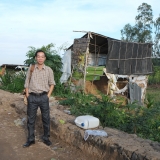Irrigation plays a critical role in Vietnam’s rural economy and the national food security priority. The Vietnamese government has developed an extensive irrigation system and waived irrigation costs for farmers to reduce rural poverty. However, excessive use of water in agriculture has become a major concern. It is important to evaluate the value of water in order to encourage economical use. We use a multi-model approach and plot-level data to indirectly estimate the value of irrigation water and address a majority of issues related to causal identification. Our results indicate that farmlands with access to irrigation have significantly higher productivity and land values. The high value of irrigation water in agricultural production is a premise for compulsory payment for irrigation water. We then investigate the design of Vietnam’s irrigation policy and the hazards that have arose from the fee waiver policy. Finally, we explain why the current policy has failed to promote a sustainable long-term solution.
Water value, irrigation policy, and implementation hazards in Vietnam’s rural economy
EfD Authors
Country
Sustainable Development Goals
Publication reference
Phu, L. V. (2023). Water value, irrigation policy, and implementation hazards in Vietnam’s rural economy. Water Resources and Economics, 43, 100229. https://doi.org/10.1016/j.wre.2023.100229
